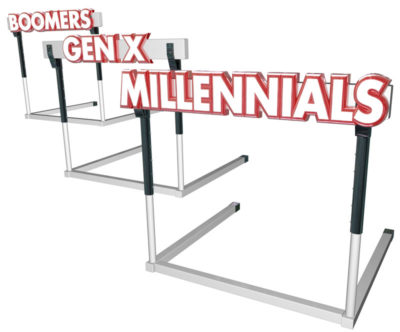
Is a Generational Gap Impacting Your Staff?

Ms. Pomerantz is the CEO of TPG HR Services USA and has over 35 years of Human Resources practices experience. She holds a Master’s in Human Resource Management (MHRM) and is a certified Senior Professional in Human Resources (SPHR) and SHRM Senior Certified Professional (SHRM-SCP). Mary also serves as CEO of Mary Pomerantz Advertising, one of the largest recruitment advertising agencies in the country. Earlier in her career, she was president of the 17th largest staffing firm in the country.

A confluence of multiple events and factors has created a modern workforce that features four-five different generations. Perhaps at no other time in U.S. history has there been such a wide range of ages among the working population. If you’re the owner of a mid-to-large size business, there’s a good chance that you have employees from multiple generations on your staff. Is a generational gap negatively impacting your staff? If so, how do you manage this generational gap to make your workplace more efficient and harmonious?
When Generations Clash

Older generations have been disparaging younger ones since the beginning of time, just as younger generations have criticized older generations for being out of touch and behind the times. It’s not uncommon for baby boomers to have different ideas of how to handle situations at work than Generation Xers, just as millennials will see things differently than Generation Z (also known as iGeneration). Managers who have multiple generations in their workforce must contend with several challenges. One of the first challenges includes overcoming the preconceived notions each generation has about the other. Additional challenges include blending work and communication styles to create an efficient staff that is greater than the sum of its parts. When leveraged the right way, these varying perspectives can be a benefit to your organization as opposed to a detriment. Here are some ways you can turn your generational gap problem into an advantage:

Have an open mind: Don’t assume that you know it all or that your younger employees don’t know enough to make a contribution. One of the traits that make younger generations stand out is their willingness to think outside the box, challenge the status quo, and push the envelope.

Develop a mentorship program: Each generation has something to offer the others. Baby boomers and traditionalists have years of experience, while millennials and iGenerationers are digital natives and often have a stronger grasp of how to use new technology.

Be mindful and supportive of generational differences: With each new generation comes different terminologies, slang, perspectives, and common practices. Be careful not to be dismissive of something just because it seems unique to a particular generation. Instead, you should embrace these differences because they foster diversity, which will only help your organization.

Don’t assume that one-size fits all: You must cater your management style to each member of your staff. The same approach will have different effects on each member of your workforce. Keep this in mind as you try to work with multiple generations.
Overcoming Generational Stereotypes
A common problem among employees and management from all generations is that many hold negative stereotypes about the other. Whether it’s a baby boomer complaining about millennials being all about themselves or iGenerationers complaining that their Generation X boss is out of touch with modern times, breaking these stereotypes will help bridge your generational gap. Every generation has something positive to offer your company.

Negative Stereotypes vs. The Reality
Baby Boomers Workplace Stereotypes
- Difficult to manage
- Won’t learn new skills
- Resistant to change
- Not up to date with technology
Baby Boomer Workplace Realities
- Team Players
- Service-oriented
- Hard-working
- Loyal to employers
Generation X Workplace Stereotypes
- Cynical
- Poor team players
- Risk takers
- Distrustful of authority
Generation X Workplace Realities
- Independent and autonomous
- Resourceful
- Adaptable
- Willing to challenge the status quo
Millennial Workplace Stereotypes
- Rejects the concept of “paying dues”
- Impatient; require instant gratification
- Don’t stay at jobs for a long time
- Entitled (“what’s in it for me attitude”)
Millennial Workplace Realities
- Optimistic
- Team oriented
- Technologically savvy
- Driven to learn and grow

Avoid Stereotypes and Treat Everyone as Individuals

Though there are absolute differences between the generations, as a manager, it’s important that you take care to avoid stereotypes and just treat each person as a unique individual. No one likes to be prejudged or lumped in with a group based solely on their age. While it’s safe to assume that your new 21-year-old employee is familiar with social media, you should not assume that the baby boomers on your staff are clueless. There are, however, some tendencies that researchers have found. One such study, conducted by Dimensional Research, examined the experiences of 1,533 HR leaders and hiring managers from the U.S., Australia, France, the Netherlands, Germany and the U.K. Here’s what they found:
- Job candidates from Generation X are more likely to ask for higher pay, hiring bonuses, and higher job titles
- Millennial job candidates are most likely to request training, job perks, and flexible work hours
- Generation X employees are most likely to ask for promotions, flexible work hours, and nonscheduled bonuses.
- Millennial employees are most likely to request mentors, training, and nonscheduled bonuses
- Baby boomers are unlikely to request anything from employers, regardless of whether they are candidates or employees. Their most common requests included extra vacation time, reduced work hours, and extended leaves of absence.
A CareerBuilder survey of 3,892 U.S. workers shed some light on different work tendencies from the different generations. Here’s what it revealed. [1]
- Younger age groups are more likely than older ones to work eight hours or less per day and were less likely to arrive before 8:00 AM.
- Younger employees are more likely to continue working after leaving the office
- Older generations are more likely to want to skip the planning process and just dive right into execution, while younger workers prefer to have a written-out plan
- Older employees think it’s important to stay at a job for at least three years, whereas younger employees think you should only stay at a job until you’ve learned enough to move up.
Bridge Your Generational Gap with an HR Services Provider
If you’re having trouble breaking through the misconceptions and stereotypes in your staff or finding it difficult for your team to work together harmoniously, an outsourced HR provider might be the solution. HR Services USA is an experienced HR provider that will allow you to focus on the core functions of your business while we focus on managing your staff. We have decades of experience in employee communications and relations, and we know how to create an all-inclusive work environment that brings out the best in all employees, regardless of their age. To learn more, contact us at 732-917-6000.
